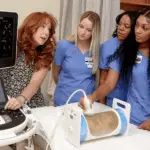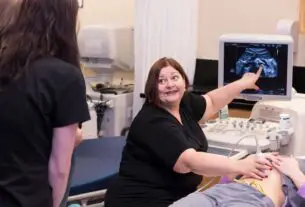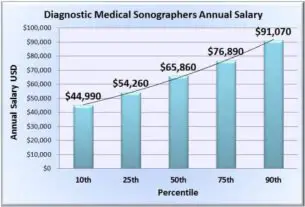Here are some things to consider when taking an ultrasound technician class:
- Accreditation: Make sure the program you choose is accredited by a recognized accrediting body, such as the Commission on Accreditation of Allied Health Education Programs (CAAHEP) or the Joint Review Committee on Education in Diagnostic Medical Sonography (JRC-DMS).
- Program length: Ultrasound technician Class can vary in length, from one year certificate programs to two-year associate’s degree programs. Consider how much time you have to commit to your education and choose a program that fits your schedule.
- Clinical experience: Many ultrasound technician programs include clinical experience as part of the curriculum. Make sure the program you choose provides sufficient hands-on training so you can gain the skills and experience you need to be successful in your career.
- Faculty: Consider the experience and qualifications of the faculty teaching the program. Look for a program with instructors who are knowledgeable and experienced in the field of ultrasound technology.
- Cost: The cost of an ultrasound technician Class can vary significantly. Consider the overall cost of the program, including tuition, fees, and any additional expenses such as textbooks or equipment.
- Job outlook: Research the job outlook for ultrasound technicians in your area to ensure there will be job opportunities available upon graduation.
- Continuing education: The field of ultrasound technology is constantly evolving, so it’s important to choose a program that will provide ongoing support for your professional development. Look for a program that offers continuing education opportunities or support for obtaining additional certifications.
Medical field is improving everyday and hence the employers look for highly skilled and hard working candidates to work for them. Ultrasound technician is such health profession which requires both skills and hard work. Young candidates applying for a position as an ultrasound technician must have skills and education on ultrasound technology from a recognized institution. One does not have to get degrees from a selected or particular institution; however aspirants must have attended a state accredited institution and should have complete knowledge on ultrasound technology. This article will help you in your path of being a skilled ultrasound technician.
Top 5 Ultrasound Technician Classes
Here are some of the top schools:
- Oregon Institute of Technology – Klamath Falls, OR
- Washburn University – Topeka, KS
- State Fair Community College – Sedalia, MO
- University of Oklahoma Health Sciences Center – Oklahoma City, OK
- Ohio State University – Columbus, OH
The admission requirements for most sonography programs require completing some combination of entry-level post-secondary classes in English, math, physical sciences, and anatomy and physiology. A designated minimum grade is also required1. Some programs may require prior experience working in the medical field.
The application process for most programs involves submitting an online application form along with official transcripts from all colleges attended and any other required documents. The duration of ultrasound tech school can vary based on the level of education you pursue and the specific program you choose. Associate degree programs typically take around 2 years to complete.
The cost to pursue an associate’s degree begins at around $7,540. A bachelor’s degree costs about $32,060 on the lower end of the range. If you are eligible to earn a certificate, then the cost of your education is even less. Certificate programs begin at around $3,770. Additional costs include textbooks, clinical evaluation system fee, liability insurance, CPR certification, and program-specific supplies.
The curriculum for most programs includes didactic and clinical instruction in sonography. Students learn about anatomy and physiology, medical terminology, patient care techniques, ultrasound physics and instrumentation, and image interpretation. The programs also include supervised clinical experience at affiliated healthcare facilities to provide hands-on training to students.
Upon successful completion of a program, graduates are eligible to take certification exams offered by the American Registry for Diagnostic Medical Sonography (ARDMS) or Cardiovascular Credentialing International (CCI) to become registered diagnostic medical sonographers or registered vascular technologists. Graduates can pursue careers as diagnostic medical sonographers or vascular technologists in hospitals, clinics, imaging centers, and other healthcare facilities.

Choose the school/ institution wisely for Ultrasound Technician Class
Choosing the best institution for your self is the crucial part in your ultrasound technician profession. There are many factors that you must consider. Accreditation from the Commission on Accreditation of Allied Health Education (CAAHEP) is the foremost thing you should consider while choosing an ultrasound technician school. There are many online sites which will guide you through it. You can also get information on such programs online. This will make it easier for you to choose schools and save your time. While choosing a school it is always better to select a school that is closer to your home.
Get to know about the Course Component & make sure it fits your requirements
Many community colleges and four year universities and colleges provide course on ultrasound technology. However, you can also find vocational trainings on this course. While you choose the institution, make sure that the education and the coursework they have fits the education course. Once you are sure they do the next step is to know if the course best fits your time and requirement. If a four year college is not the best option for you then you might want to get an associate degree which can be completed in two years.
You can also think of Online Ultrasound Technician Classes
Sometimes students are not comfortable learning in schools or cannot manage time for school. Then in that case you might also want to consider taking online course. Online ultrasound technician classes are offered by many institutions. Such courses are highly beneficial to students who like learning on their own with some guidance. You can get the same knowledge and learning experience in online courses as you can while attending classes.
Be Familiar with your school
Apart from finding a school and selecting a program sitting at home you should once go and visit the school. This will familiarize you with the school and the working environment. Taking to the faculty and hearing from them about the program will guide you for the course and prepare you for the days to come. Make sure you familiarize with everything you have to learn as an ultrasound technician.
What classes to take to be an ultrasound technician?
To become an ultrasound technician, you will need to complete a formal education program in diagnostic medical sonography. These programs are typically offered at community colleges, technical schools, and universities, and can lead to a certificate, associate’s degree, or bachelor’s degree.
Typically, ultrasound technician programs include coursework in anatomy, physiology, medical terminology, and patient care, as well as hands-on clinical training in the use of ultrasound equipment. Some programs may also include coursework in related areas such as healthcare ethics, patient communication, and medical law and regulations.
Here are some specific classes you may take as part of an ultrasound technician program:
- Anatomy and physiology: This course will cover the structure and function of the human body, including the musculoskeletal, cardiovascular, respiratory, and nervous systems.
- Medical terminology: This course will introduce you to the specialized language used in the medical field, including prefixes, suffixes, and word roots.
- Patient care: This course will teach you how to interact with patients in a professional and compassionate manner, including how to obtain and record patient history and vital signs.
- Ultrasound physics: This course will cover the principles of sound waves and how they are used in diagnostic imaging, including the characteristics of different types of ultrasound equipment.
- Clinical training: This course will provide hands-on experience using ultrasound equipment to perform diagnostic exams on patients. You will learn how to obtain high-quality images and assist the physician in interpreting the results.
- Abdominal sonography: This course will focus on the use of ultrasound to visualize the organs and structures within the abdominal cavity, including the liver, spleen, and pancreas.
- Obstetrical and gynecological sonography: This course will cover the use of ultrasound in obstetrical and gynecological exams, including fetal development and gynecological disorders.
Step by Step guide to find ultrasound technician classes near me?
Here are some steps you can follow to find ultrasound technician class near you:
- Research accredited programs: Start by searching for programs that are accredited by a recognized accrediting body, such as the Commission on Accreditation of Allied Health Education Programs (CAAHEP) or the Joint Review Committee on Education in Diagnostic Medical Sonography (JRC-DMS). This will ensure that the program meets the highest standards for education in the field of ultrasound technology.
- Search for programs in your area: Use online resources or directory listings to find ultrasound technician programs near you. You can also contact local community colleges, technical schools, and universities to inquire about their programs.
- Consider program length and cost: Ultrasound technician Class can vary in length, from one year certificate programs to two-year associate’s degree programs. Consider how much time you have to commit to your education and choose a program that fits your schedule. Also, consider the overall cost of the program, including tuition, fees, and any additional expenses such as textbooks or equipment.
- Check the program’s clinical experience: Many ultrasound technician class include clinical experience as part of the curriculum. Make sure the program you choose provides sufficient hands-on training so you can gain the skills and experience you need to be successful in your career.
- Research the faculty: Consider the experience and qualifications of the faculty teaching the program. Look for a program with instructors who are knowledgeable and experienced in the field of ultrasound technology.
- Consider the job outlook: Research the job outlook for ultrasound technicians in your area to ensure there will be job opportunities available upon graduation.
- Look for continuing education opportunities: The field of ultrasound technology is constantly evolving, so it’s important to choose a program that will provide ongoing support for your professional development. Look for a program that offers continuing education opportunities or support for obtaining additional certifications.
Can I take ultrasound technician class online?
Yes, it is possible to take online Ultrasound Technician classes as part of an ultrasound technician program. Many schools offer online or hybrid programs that combine online coursework with hands-on clinical experience.
Online programs can be a convenient option for students who cannot attend classes in person due to location or scheduling constraints. However, it is important to note that ultrasound technician programs typically require hands-on clinical training in order to prepare students for the practical aspects of the job. This means that online programs may require you to travel to a clinical site for hands-on training.
It is also worth noting that not all online programs are accredited by recognized accrediting bodies, such as the Commission on Accreditation of Allied Health Education Programs (CAAHEP) or the Joint Review Committee on Education in Diagnostic Medical Sonography (JRC-DMS). Accreditation is important because it ensures that the program meets the highest standards for education in the field of ultrasound technology. Be sure to carefully research any online program you are considering to ensure it is accredited and will provide the education and training you need to be successful in your career.
How to find for ultrasound technician evening classes?
- Research accredited programs: Start by searching for programs that are accredited by a recognized accrediting body, such as the Commission on Accreditation of Allied Health Education Programs (CAAHEP) or the Joint Review Committee on Education in Diagnostic Medical Sonography (JRC-DMS). This will ensure that the program meets the highest standards for education in the field of ultrasound technology.
- Contact local schools: Contact local community colleges, technical schools, and universities to inquire about their ultrasound technician programs. Ask about the availability of evening Ultrasound Technician Class or other flexible scheduling options.
- Search online: Use online resources or directory listings to find ultrasound technician programs in your area. Many schools offer online or hybrid programs that combine online coursework with hands-on clinical experience, which may be more convenient for students who cannot attend classes in person due to work or other commitments.
- Consider program length and cost: Ultrasound technician Class can vary in length, from one year certificate programs to two-year associate’s degree programs. Consider how much time you have to commit to your education and choose a program that fits your schedule. Also, consider the overall cost of the program, including tuition, fees, and any additional expenses such as textbooks or equipment.
- Check the program’s clinical experience: Many ultrasound technician Class include clinical experience as part of the curriculum. Make sure the program you choose provides sufficient hands-on training so you can gain the skills and experience you need to be successful in your career.
- Research the faculty: Consider the experience and qualifications of the faculty teaching the program. Look for an Ultrasound Technician Class with instructors who are knowledgeable and experienced in the field of ultrasound technology.
- Consider the job outlook: Research the job outlook for ultrasound technicians in your area to ensure there will be job opportunities available upon graduation.
Job Outlook of an Ultrasound Technician
The job outlook for ultrasound technicians is generally positive. According to the U.S. Bureau of Labor Statistics (BLS), employment of diagnostic medical sonographers, which includes ultrasound technicians, is projected to grow 11% from 2020 to 2030, faster than the average for all occupations. This growth is expected to be driven by the increasing use of ultrasound technology in the diagnosis and treatment of medical conditions, as well as an aging population that will require more medical care.
Ultrasound technicians may find employment in a variety of settings, including hospitals, diagnostic imaging centers, physicians’ offices, and outpatient care centers. They may also work in specialized areas of sonography, such as obstetrical and gynecological sonography, vascular sonography, or echocardiography.
In addition to job growth, ultrasound technicians can expect to earn a competitive salary. According to the BLS, the median annual wage for diagnostic medical sonographers was $75,320 in May 2020.
It is worth noting that the job outlook and salary potential for ultrasound technicians may vary depending on factors such as geographic location, level of education and training, and years of experience. It is important to research the job market in your area and consider the specific requirements and qualifications for employment as an ultrasound technician.













